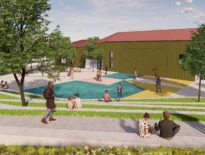An analysis commissioned by Gov. Charlie Baker suggests that demand for office space in Massachusetts could fall by 10 to 20 percent by 2030 thanks to the fallout from the COVID-19 pandemic, but significant questions remain.
The 82-page Future of Work Report, prepared by McKinsey & Co., laid out three possible scenarios its authors considered “viable”: one where trends return to their trajectories pre-COVID, one where trends continue to accelerate at current pandemic speeds and one where hybrid and remote work become permanent, while other trends continue to accelerate at pandemic speeds.
Under the first scenario, the report predicted office demand in the city of Boston could grow by 2.7 million square feet, shrink by 12.7 million square feet under the second and drop by 20.6 million square feet under the third. The report predicts similar changes in other submarkets across Massachusetts, with generally the same 12 percent drop in office demand being seen in the second scenario and an 18 percent to 19 percent decline in the third scenario.
Class B and C space could see the biggest demand reduction, McKinsey predicted, although the rise in office-to-lab conversions could ultimately mitigate this.
Up to 32 percent of Massachusetts workers could theoretically do their jobs remotely, the report’s authors calculated.
The report couched its predictions in uncertain terms, noting that remote work trends are still evolving and many businesses are still experimenting with what hybrid and remote-work policies work best for them.
Daily occupancy at downtown Boston offices hit 18 percent in some buildings in the second quarter and the pace of negative net absorption slackened, according to Newmark research. The huge volumes of downtown sublease space that hit the market in 2020 continues to chip away, thanks to reoccupations and an increase in demand for shorter-term leases, Newmark found.
The reduced foot traffic drops like the ones McKinsey predicts could create could imperil many retail businesses and restaurants, the report notes, and an increase in the feasibility of remote work could also threaten the state’s ability to attract new residents thanks to the high cost of living in Greater Boston.
Transit agencies may also see their fare-focused business models challenged, the report says, particularly the MBTA’s commuter rail network.
To mitigate this, the report says Massachusetts needs between 125,000 and 200,000 new housing units built by 2030 to bring the state up to national vacancy benchmarks and an additional 25,000 to 30,000 additional childcare workers to support flexible childcare options for residents.
Researchers behind the 2021 Greater Boston Housing Report Card found the state is on pace to build 135,000 homes by 2025, but far behind what would be needed to add 185,000 in the Greater Boston area by 2030.
With a trend towards more remote work, the McKinsey report says, demand for the ability to walk and bike around neighborhoods, and for “15-minute cities,” where most services can be found within 15 minutes of home, is likely to increase.
At a press conference marking the report’s release, Gov. Charlie Baker and Lt. Gov. Karyn Polito made a case that the administration’s proposal to invest $2.9 billion in federal COVID-19 aid would help Massachusetts get ahead of any potential economic shifts.
The money – intended to backstop the state budget and pay for COVID-19 response, but unneeded thanks to strong tax receipts – includes $1 billion, split roughly evenly, for housing production and down-payment assistance to first-time homebuyers.
“One of the reasons we focused on down payment assistance was because we’re in the middle of an explosive growth of housing prices generally,” Baker said. “I worry that we’re going to push people who don’t have the ability to buy out of the communities they’re in.”
The year-to-date median statewide single family sale price increased 17.9 percent in May over the same figure in May 2020, to $480,000 according to The Warren Group, publisher of Banker & Tradesman. The median condominium sale price also increased 8.4 percent, to $450,000, on the same basis.
Baker said the acceleration of home prices creates an urgency and “we would get started on that soon instead of 9 months or a year from now,” referencing the legislature’s stated plans to hold hearings later this summer and fall on how to spend the state’s roughly $5 billion in federal relief money.







